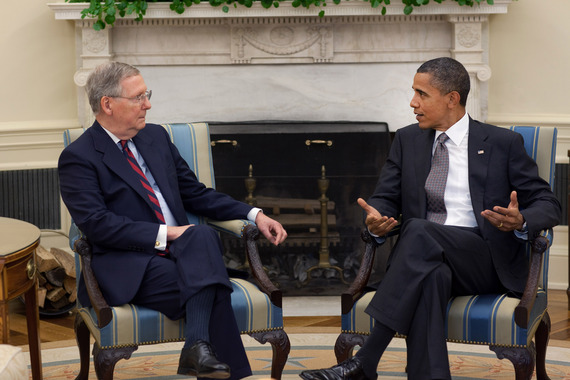As the race narrows around a likely Donald-Hillary fight, Republican elites have lamented that there may be another President Clinton come 2017. Betting markets agree. Hillary Clinton boasts a 68% likelihood of being the next president, while Trump has a slim 19%. Every other candidate is at 3% or less.
Despite these odds of a Democratic three-peat, Senate Republicans have stuck to their argument that the next president, and not President Obama, should appoint the new Supreme Court justice.
"If Hillary is elected, and certainly if there's a Democratic Senate, the Republicans would be much better off with a moderate nominee now," said Harvard constitutional law professor Lawrence H. Tribe in an interview with James B. Stewart. "That's a rational way of looking at it."
But waiting until 2017 to fill the court vacancy is indeed a rational, if cynical, stance for Republicans.
As Chuck Todd and Chris Cillizza remarked on a recent Meet the Press, each presidency has "one big swing," one fight in which to spend the political capital of their election. And, Todd notes, "if your first hundred days is dominated by a Supreme Court fight, in [this] environment, you will get nothing else done."
With that in mind, Republican obstruction makes political sense. Whether approved under a lame-duck President Obama or a newly elected President Clinton, the new justice would vote with the court's liberals. With more 5-4 splits than ever, neither appointer-in-chief could pass up the opportunity to shift the court's balance.
However, waiting until 2017 puts a steeper price tag on the appointment. President Clinton would have to spend her "one big swing" on the nomination battle, while President Obama would get a legacy-defining appointment on the cheap.
Unless politics magically becomes less polarized over the course of an election year, that rationale isn't likely to change.
Of course, individual Republican senators may break ranks if voter anger over the court vacancy threatens their own reelection chances, as some early polling indicates. It's a particularly tough cycle for the GOP. Of the eight seats in serious contention, six are Republican-held. And five of those are in presidential battleground states, where scorched-earth tactics will have down-ticket effects beyond whatever impact a Trump nomination holds.
At a party level though, Senate obstruction is actually a rational move for a Republican establishment that's witnessed its share of irrational behavior this year.
